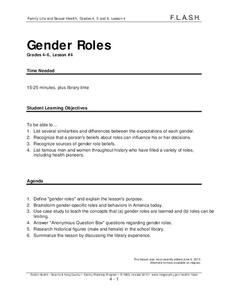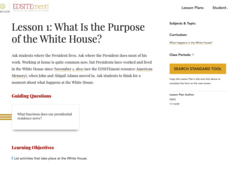Seattle & King County Family-Planning Program
Gender Roles
Class members identify gender-specific roles and expectations in American society today by surveying adults, examining modern entertainment, and researching historical figures.
Alabama Department of Archives and History
Strange Fruit: Lynching in America
To continue their study of the Civil War, Reconstruction, and the beginning of the civil rights movement, class members watch the YouTube video of Billie Holiday singing "Strange Fruit" as an introduction to an examination of lynching in...
Children's Museum of Indianapolis
Anne Frank: Facing Hatred, Daring to Dream
The stories of Anne Frank, Ruby Bridges, and Ryan White illustrate the power of children to make a difference. The three lesson in this must-have resource are designed to inspire young people to make a difference in their world....
National Endowment for the Humanities
NAACP’s Anti-Lynching Campaign in the 1920s
Students investigate the anti-lynching campaign of the NAACP in the 1920's. In this human rights instructional activity, students prepare for and participate in a simulated debate of the Dyer Anti-Lynching Bill that was presented to...
Smithsonian Institution
Solomon G. Brown: Letter Writing
Personal correspondence in the form of letters is not as common as it once was. This resource presents an opportunity for you to introduce your class to letter writing and cover topics in social studies. Learners read a letter written in...
Alabama Department of Archives and History
W.E.B. DuBois, Booker T. Washington, and Jim Crow
Class members use the think-pair-share strategy to compare the views of W.E.B. Du Bois and Booker T. Washington and to consider how each man's backgrounds influenced his philosophy.
Alabama Department of Archives and History
Yellow Journalism
What role did yellow journalism play in bringing the United States into war with Spain? As part of their study of the Spanish-American War, class groups examine newspapers of the times and other texts and then produce their own...
Constitutional Rights Foundation
Immigration Enforcement Raids
Class groups take on the role of advisors to the Assistant Secretary of the Office of Policy & Planning of ICE. Their charge is to prepare a report for the secretary on the effectiveness of enforcement actions of the ICE in stemming...
Peace Corps
Celebrating Our Connections Through Water
Water is vital for survival, but how does it help global cultures flourish? Elementary and middle schoolers learn about the different cultures around the world that celebrate water and incorporate it into their festivals or traditions.
Cancer Care
What is Breast Cancer?
How gets breast cancer? What are the hereditary risk factors? Can individuals reduce their risk factors? If you are looking for a resource to use during October's in Breast Cancer Awareness Month, check out the lessons in this packet.
Alabama Department of Archives and History
New York Times Co. v Sullivan: The Alabama Case that Changed Libel Law
Malice aforethought? Can the New York Times be held libel for false claims appearing in its ads? The Supreme Court case New York Times v Sullivan changed the interpretation of the First Amendment. Class members examine these changes and...
National Park Service
A Tale of Two Men
Theodore Roosevelt and the Marquis de Mores were both born in 1858, and both came to the Dakota territory in 1883, but they influenced the developing country of America in different ways. Elementary and middle schoolers apply written and...
Museum of Tolerance
Music Evokes Memories and Emotions
Dim the lights, take a deep breath, and press play to explore the emotions and memories that music elicits. Class members begin using relaxation techniques designed to create a positive listening experience. As music plays, learners...
Civil War Trust
Civil War Personalities Lesson Plan
Caring, trustworthiness, and responsibility—these are only a few character traits in focus of a lesson based on stories from the Civil War era. Class members explore several influential lives while reading biographies that highlight...
Macmillan Education
Cultural Awareness
The importance of cultural awareness, of becoming aware of our own and other cultures, and the benefits of gaining a deeper understanding of the differences between cultures, is the focus of this resource. Working individually, in pairs,...
Kenan Fellows
Unit 1: Introduction to Biotechnology
Biotechnology is big! Introduce the uses of biotechnology to science scholars with a fascinating, fact-filled unit. The first installment in a series of four biotechnology units covers the role biotechnology plays in human and...
National Endowment for the Humanities
Lesson 1: What Is the Purpose of the White House?
Pupils view images of presidents working and living at the White House. They list activities that take place at the White House and discuss the many purposes of the building.
Alabama Department of Archives and History
Alabama Slave Codes in 1833: What They Can Teach Us About Slaves Themselves
After viewing a short PowerPoint about Nat Turner's rebellion, class groups examine Alabama's 1833 slave codes. Individuals then develop a mini-legal brief arguing against one particular slave law.
Alabama Department of Archives and History
Booker T. Washington and W.E.B. DuBois
Where to begin? With the vocational education that provides the skills necessary to gain economic security or with a Liberal Arts education? As part of a study of leaders of the civil rights movement, class members compare and contrast...
Alabama Department of Archives and History
Marketing a Bad Idea: Why So Many People Joined the Klan in the 1920s
How did the Klu Klux Klan manage to gain so many members during the 1920s? Class members examine Klan documents and promotional materials to gain an understanding of the propaganda techniques used to attract members.
Alabama Department of Archives and History
"Scottsboro Boys": A Trial Which Defined an Age
Here's a must-have resource. Whether your focus is racism, the Great Depression, the "Scottsboro Boys" trial, or part of a reading of To Kill A Mockingbird, the information contained in the seven-page packet will save hours of research...
Curated OER
Create a Magic Lantern Show; Freed People in the Reconstruction South
Engage your scholars by having them create "magic lantern shows" inspired by the film Dr. Toer's Amazing Magic Lantern Show: A Different View of Emancipation. As they study the South's Reconstruction through primary sources, learners...
Alabama Department of Archives and History
Alabama's 1901 Constitution: What Was at Stake?
Who should be able to vote? As part of a study of the 1901 Alabama Constitution, class members examine primary source document that reveal the reasons the authors gave to support their positions on this question and their assumptions in...
Alabama Department of Archives and History
Alabama's New South Era
The industrialization and urbanization of Alabama during the New South era (1865-1914) is the focus of a lesson that asks class members to use primary source documents to examine the impact of industrialization on Alabama workers and...

























